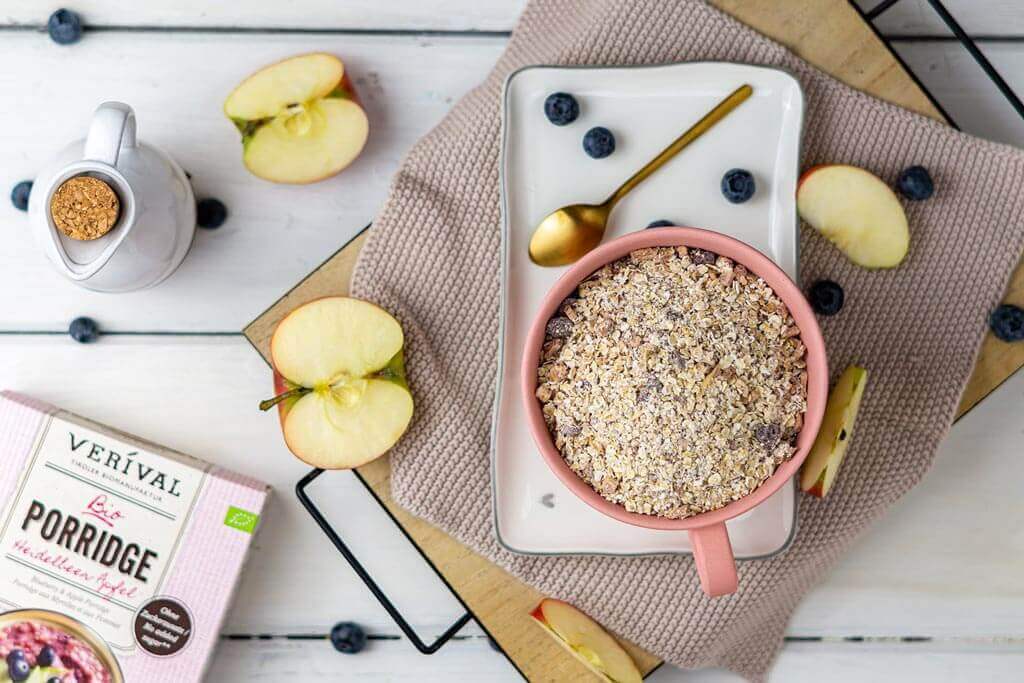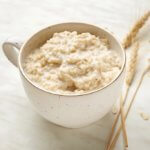Porridge: Miracle cure for digestive problems
November 22, 2021- Breakfast
- Healthy lifestyle
- Nutrition

It has long been known that porridge has a lot of health benefits. Porridge is not only an excellent source of vegetable protein and regulates blood sugar levels, but is also said to help with digestive problems of all kinds.
Anyone who struggles with their gut health is well aware of the impact it has on their overall wellbeing. But what can you do to get your intestinal flora back on track? Can porridge really help? This article tells you everything you need to know.
Übersicht
Why is gut health so important?
The functions of the gut go far beyond the digestion of food. It transports important nutrients from food into the blood so that our organs can perform their vital tasks every day. Moreover, the majority of immune cells are located in the gut, making it an indispensable part of the immune system.
If intestinal health is out of balance, pathogens have an easy time of it. They can then more easily invade our finely tuned system and eventually make us sick. That’s why it’s especially important to take care of a healthy gut.
But what can you do if your digestion goes haywire? In the next section you will learn what can help.
Does porridge help with digestive problems?
Even our great-grandmothers knew about the beneficial effects of oat flakes on the intestines. Whether for diarrhoea, irritable bowel syndrome or constipation – a portion of porridge can take care of it. Is there really any truth to the effect of this little home remedy? In fact, science can also prove that oat flakes have a positive effect on intestinal health. According to various studies conducted, the intestinal flora benefits from regular consumption of the regional superfood.
For example, they increase the amount of bifidobacteria and lactobacilli in the gut, which are essential for intestinal health. In short, they keep pathogens at bay and support the intestines in releasing important nutrients into the blood. As a result, they are also essential in strengthening the immune system. (1)

Dietary fibre for a healthy gut
One important ingredient in oat flakes that stimulates intestinal activity is dietary fibre. If you eat enough of it, you ensure that the food mush passes through the intestine more quickly. This can prevent unpleasant symptoms such as constipation or haemorrhoids.
A distinction is made between soluble and insoluble dietary fibres. While the first group is mainly found in fruit and vegetables, but also in oats, the second group is more likely to be found in whole grain products and pulses. Insoluble dietary fibres swell up in the stomach and therefore keep you full for a long time. In contrast, soluble dietary fibres serve as food for intestinal bacteria and are also known as prebiotics.
How to take care of your intestinal health
In order to do something good for your sensitive intestines, you should pay attention to which foods you eat and which you should avoid.
| positive effect on intestinal health | negative effect on intestinal health |
| dietary fibre (e.g. oat flakes, linseed, wholemeal products, fruit and vegetables | coffee, alcohol and highly sweetened drinks |
| plenty of fluids (especially water and unsweetened tea) | highly processed foods and fast food |
| unsaturated fatty acids (e.g. nuts, vegetable oils, avocado) | saturated fatty acids from animal sources |
| probiotic foods (e.g. natural yoghurt, kefir) | refined sugar |
The best breakfast for digestive complaints
Breakfast is often a particularly critical meal for people with intestinal problems. For example, the symptoms of irritable bowel syndrome are particularly intense in the morning and sufferers struggle with severe abdominal pain after getting up.
Since the cortisol level also increases in the morning and slowly decreases in the course of the day, this increased symptomatology is associated with the stress hormone in the literature. People with irritable bowel syndrome are thought to have a higher rise and slower fall of cortisol.
Not eating breakfast prevents the cortisol level from dropping as usual and so physiological stress remains high. This makes it all the more important not to forgo the morning meal, because the right breakfast is a good way to counteract digestive problems of all kinds.

Since porridge has a soothing effect on digestive problems, the warm oatmeal is ideal as a feel-good breakfast. With healthy fats in the form of seeds, nuts or nut puree and additional fibre from fresh fruit, you’ll have the ideal dish to protect your intestinal flora in no time.
You can either use milk or a plant-based milk alternative to prepare the porridge, or mix it with water in the classic way. VERIVAL porridges make it quick and easy. The porridge of your choice just needs to swell in hot liquid for a few minutes and it’s ready to eat.
Basic recipe: Oatmeal
Ingredients
- 250 ml milk or a plant-based alternative
- 50 g oat flakes
- A pinch of salt
- 2 tbsp honey or agave syrup
- 1/2 tbsp cinnamon
Instructions
- Heat up the oat flakes with a pinch of salt and the sweetener of your choice (honey or agave syrup) in the milk or plant-based drink (do not forget to stir well).
- Let the porridge steep for 3 minutes.
- Put the porridge into a bowl and sprinkle it with cinnamon.
- Enjoy!
Nutrition
Source:
(1) Renee Korczak, Megan Kocher, Kelly S Swanson, Effects of oats on gastrointestinal health as assessed by in vitro, animal, and human studies, Nutrition Reviews, Volume 78, Issue 5, May 2020, Pages 343–363, https://doi.org/10.1093/nutrit/nuz064











